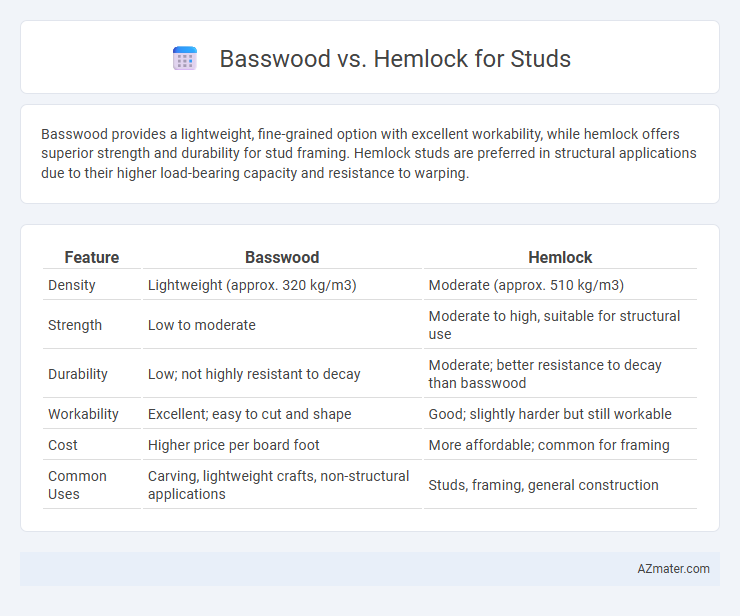Basswood provides a lightweight, fine-grained option with excellent workability, while hemlock offers superior strength and durability for stud framing. Hemlock studs are preferred in structural applications due to their higher load-bearing capacity and resistance to warping.
Table of Comparison
| Feature | Basswood | Hemlock |
|---|---|---|
| Density | Lightweight (approx. 320 kg/m3) | Moderate (approx. 510 kg/m3) |
| Strength | Low to moderate | Moderate to high, suitable for structural use |
| Durability | Low; not highly resistant to decay | Moderate; better resistance to decay than basswood |
| Workability | Excellent; easy to cut and shape | Good; slightly harder but still workable |
| Cost | Higher price per board foot | More affordable; common for framing |
| Common Uses | Carving, lightweight crafts, non-structural applications | Studs, framing, general construction |
Introduction to Basswood and Hemlock as Stud Materials
Basswood and hemlock are two common stud materials used in construction, each offering distinct properties. Basswood is valued for its lightweight nature, fine grain, and ease of machining, making it suitable for applications requiring precision and smooth finishes. Hemlock provides greater structural strength and durability, often preferred for load-bearing walls due to its higher density and resistance to warping.
Botanical Characteristics of Basswood and Hemlock
Basswood (Tilia americana) is a deciduous hardwood tree characterized by its broad, heart-shaped leaves, pale yellow-green flowers, and light, soft wood with fine, even texture ideal for carving and construction. Hemlock (Tsuga canadensis) is a coniferous softwood tree featuring flat, short needles with two white stomatal bands underneath, small pendulous cones, and durable yet lightweight wood commonly used for framing and structural studs. The distinct botanical features of basswood's broadleaves and hemlock's needle foliage reflect their differing growth habits and wood properties crucial for selecting appropriate stud material.
Strength and Durability Comparison
Basswood offers moderate strength with a Janka hardness of about 410, making it softer and less durable compared to Hemlock, which has a Janka hardness of approximately 560. Hemlock provides greater structural strength and resistance to wear, making it preferable for stud framing in construction where durability is critical. Due to its moderate density and stability, Hemlock also resists warping and splitting better than Basswood, enhancing its long-term performance in load-bearing applications.
Workability and Ease of Use
Basswood offers superior workability compared to hemlock due to its fine, even texture and softness, making it easy to saw, shape, and sand with minimal effort. Hemlock, while moderately easy to work with, has a coarser grain and can be prone to splintering, requiring sharper tools and more skill during handling. For stud framing, basswood's ease of use enhances precision and reduces labor time, whereas hemlock provides slightly better durability but can slow down the construction process.
Weight and Density Differences
Basswood features a lower density, typically around 0.32 g/cm3, making it significantly lighter than hemlock, which has a density near 0.45 g/cm3. The weight difference impacts structural applications, with hemlock providing greater strength and stability due to its higher mass per volume. This makes hemlock preferable for studs requiring robust support, while basswood suits lighter, non-load-bearing framing.
Resistance to Decay and Insects
Basswood exhibits moderate resistance to decay and insects, making it less ideal for stud applications in moist or pest-prone environments. Hemlock offers better natural resistance to decay but is still vulnerable to insect damage without treatment. For structural studs, treated Hemlock generally provides enhanced durability compared to untreated Basswood.
Availability and Cost Factors
Basswood is generally more available in specialty lumber markets but can be less common than hemlock, which is widely found across North America, making hemlock a more accessible choice for studs. Cost-wise, hemlock tends to be more affordable due to its abundance and faster growth rate, while basswood is pricier owing to its softness and suitability for fine detailing. Availability and pricing often drive the selection, with hemlock favored for budget-conscious projects and basswood chosen when workability or specific structural qualities are needed.
Environmental Impact and Sustainability
Basswood offers a lower environmental impact than hemlock due to its faster growth rate and higher carbon sequestration capacity, promoting sustainable forestry practices. Hemlock, while abundant, has a slower regeneration cycle and requires careful management to prevent ecosystem disruption. Sustainable harvesting of basswood supports biodiversity and soil health more effectively compared to conventional hemlock logging methods.
Applications and Best Uses for Studs
Basswood is favored for stud framing in lightweight construction and crafts due to its fine grain and ease of shaping, making it ideal for non-load-bearing interior partitions and decorative applications. Hemlock offers superior strength and durability, making it suitable for load-bearing walls, structural studs, and framing in residential and commercial buildings. Both woods provide reliable performance, but hemlock's higher density and resistance to warping make it the preferred choice for structural integrity in demanding construction projects.
Final Verdict: Which Wood is Better for Studs?
Basswood offers a softer texture and easier workability, making it suitable for light framing and non-load-bearing studs, while Hemlock provides superior strength, durability, and resistance to warping, ideal for load-bearing applications. Hemlock's higher density and structural integrity make it the preferred choice for stud framing in both residential and commercial construction. For projects requiring robust support and longevity, Hemlock is the better wood for studs.

Infographic: Basswood vs Hemlock for Stud
 azmater.com
azmater.com